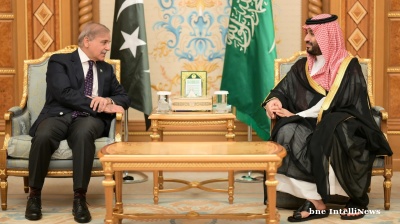Mohammad Baqer Qalibaf, a prominent Iranian politician and former military and police commander, has seen his presidential aspirations collapse following a poor showing in the recent Iranian presidential election, marking a continued decline in his electoral fortunes over the past two decades.
Qalibaf, who has pursued the presidency since 2005, finished third in the 14th presidential election with 3,383,340 votes, failing to advance to the runoff. This result represents a significant drop from his previous attempts, reflecting a downward trend in his popularity among Iranian voters after a series of corruption scandals ruined his public persona.
In 2005, Qalibaf secured 4,075,189 votes in an election with 63% turnout, finishing fourth among seven candidates. His best performance came in 2013, when he garnered 6,077,292 votes with a 73% turnout, though he still fell short of victory. However, the latest election, with only 40% participation, saw his support dwindle considerably.
The decline in Qalibaf's electoral appeal extends beyond presidential races. In the 2024 parliamentary elections he received 447,905 votes for his Tehran seat, a sharp decrease from the 1,265,287 votes he obtained in 2019. This represents a loss of over 800,000 votes in just one electoral cycle for his parliamentary position.
Qalibaf previously had the support of Tehran’s age-old and well-off “bazaar class”, who supported his executive management style of politics, but even that group appears to have either shifted to other candidates, likely split between Jalili for the more conservative voters and Pezeshkian for those who want to trade with abroad.
Political analysts suggest this declining pattern indicates waning public support for Qalibaf, who has held various high-profile positions, including Tehran mayor and parliament speaker. His inability to translate these roles into a successful presidential bid has raised questions about his political future.
Most recently Qalibaf faced public backlash over what has been dubbed in some circles "SismuniGate", referring to the baby products scandal. In April 2022, his wife, daughter and son-in-law were reported to have travelled to Turkey to purchase baby clothes and accessories, causing outrage amid falling living standards in Iran.
This controversy adds to a long list of scandals associated with Qalibaf. During his tenure as mayor of Tehran from 2005 to 2017 he was implicated in several corruption cases, including accusations of mismanaging funds and granting valuable properties to associates at below-market rates. One significant allegation involved providing land and financial benefits worth nearly $20mn to his wife's charity institute.
Qalibaf's past as a military and police commander has also come under scrutiny. He has been linked to violent crackdowns on student protests in 1999 and 2003, admitting to obtaining permits for lethal force against students. His tenure as police chief was marked by allegations of human rights violations, including the detention and torture of journalists, bloggers, and political activists.
During his 2005 and 2013 presidential campaigns Qalibaf faced allegations of connections to drug and fuel smuggling rings, though these claims were never officially investigated.
Despite these controversies, Qalibaf has maintained significant influence in Iranian politics, largely due to his strong ties with Supreme Leader Ali Khamenei and other influential figures. However, the cumulative effect of these scandals, coupled with his declining electoral performance, appears to be taking its toll on his political aspirations.
"The presidency may not be in Qalibaf's destiny," remarked a minister in the current administration, highlighting the persistent challenges faced by the politician in his quest for Iran's highest elected office.
The June 28 presidential election, which saw a historically low turnout of 40%, has been interpreted by some as a sign of growing political apathy among Iranian voters. This environment has proved particularly challenging for established political figures like Qalibaf, who have struggled to mobilise their traditional support bases.
Qalibaf's campaign strategy, which has evolved over the years from emphasising his military background to focusing on his executive experience as Tehran's mayor, appears to have lost its effectiveness. Critics argue that his frequent attempts at the presidency have led to voter fatigue and a perception of political opportunism.
As Iran prepares for a runoff between Masoud Pezeshkian and Saeed Jalili, Qalibaf's political future remains uncertain. His influence in Iranian politics appears to be diminishing, and it remains to be seen whether he can reinvent his political image or if this latest setback marks the end of his presidential ambitions.
The outcome of this election cycle may signal a broader shift in Iranian politics, with voters seemingly looking for new faces and fresh approaches to address the country's challenges.
For Qalibaf and other establishment figures, this trend could necessitate a significant recalibration of their political strategies and worries further up the power leader in the country that their presence after decades of economic mismanagement scandals.
News

Trump mistakes Armenia for Albania for the third time at UK press conference
US president says he brought peace to “Aberbaijan” and Albania as he touts his peacemaker credentials during UK state visit.

Iran conducts evening ballistic missile test at Semnan facility
Iran conducts evening ballistic missile test at Semnan range with Sejjil-class system, residents report dramatic launch amid heightened security around military facility.

Pakistan gives Saudi Arabia a landmark Article 5 collective security guarantee
In what is likely to be a game-changing decision, Pakistan, a nuclear power, has given Saudi Arabia an Article 5-like collective security guarantee.
_1758207765.jpg)
Latin America's development gains under threat as one in four live in poverty, UN report finds
UNDP warns of stagnation and rising vulnerability across the region amid "overlapping crises".

.jpg)

